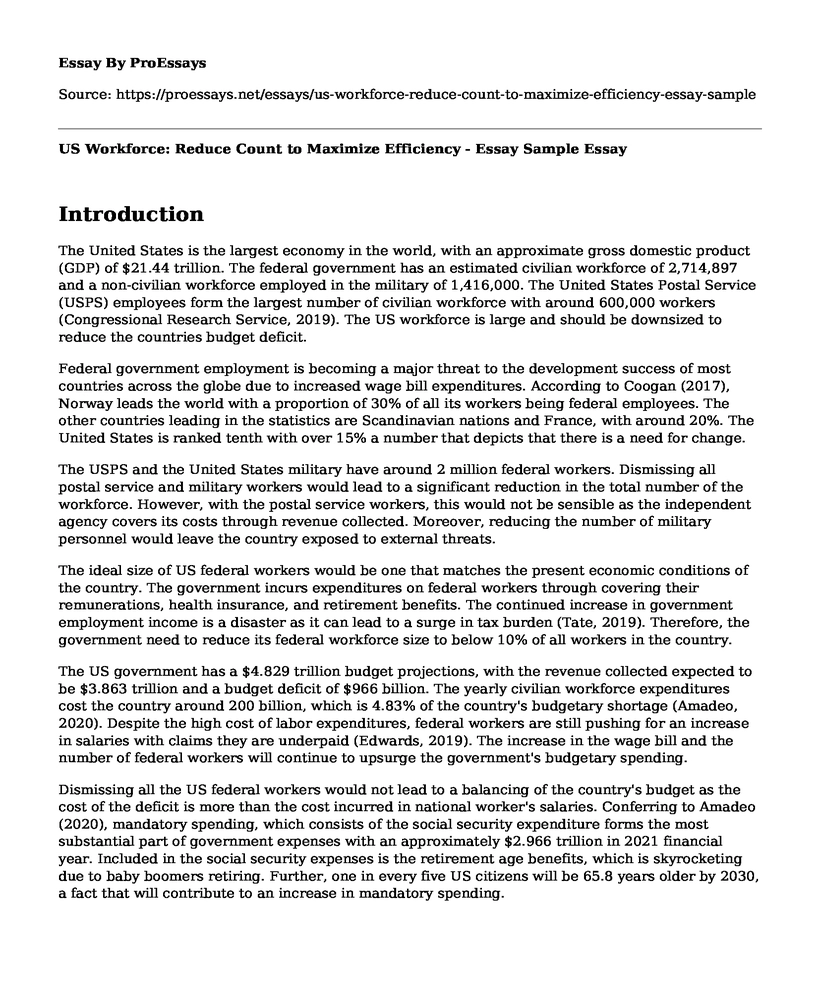Introduction
The United States is the largest economy in the world, with an approximate gross domestic product (GDP) of $21.44 trillion. The federal government has an estimated civilian workforce of 2,714,897 and a non-civilian workforce employed in the military of 1,416,000. The United States Postal Service (USPS) employees form the largest number of civilian workforce with around 600,000 workers (Congressional Research Service, 2019). The US workforce is large and should be downsized to reduce the countries budget deficit.
Federal government employment is becoming a major threat to the development success of most countries across the globe due to increased wage bill expenditures. According to Coogan (2017), Norway leads the world with a proportion of 30% of all its workers being federal employees. The other countries leading in the statistics are Scandinavian nations and France, with around 20%. The United States is ranked tenth with over 15% a number that depicts that there is a need for change.
The USPS and the United States military have around 2 million federal workers. Dismissing all postal service and military workers would lead to a significant reduction in the total number of the workforce. However, with the postal service workers, this would not be sensible as the independent agency covers its costs through revenue collected. Moreover, reducing the number of military personnel would leave the country exposed to external threats.
The ideal size of US federal workers would be one that matches the present economic conditions of the country. The government incurs expenditures on federal workers through covering their remunerations, health insurance, and retirement benefits. The continued increase in government employment income is a disaster as it can lead to a surge in tax burden (Tate, 2019). Therefore, the government need to reduce its federal workforce size to below 10% of all workers in the country.
The US government has a $4.829 trillion budget projections, with the revenue collected expected to be $3.863 trillion and a budget deficit of $966 billion. The yearly civilian workforce expenditures cost the country around 200 billion, which is 4.83% of the country's budgetary shortage (Amadeo, 2020). Despite the high cost of labor expenditures, federal workers are still pushing for an increase in salaries with claims they are underpaid (Edwards, 2019). The increase in the wage bill and the number of federal workers will continue to upsurge the government's budgetary spending.
Dismissing all the US federal workers would not lead to a balancing of the country's budget as the cost of the deficit is more than the cost incurred in national worker's salaries. Conferring to Amadeo (2020), mandatory spending, which consists of the social security expenditure forms the most substantial part of government expenses with an approximately $2.966 trillion in 2021 financial year. Included in the social security expenses is the retirement age benefits, which is skyrocketing due to baby boomers retiring. Further, one in every five US citizens will be 65.8 years older by 2030, a fact that will contribute to an increase in mandatory spending.
Conclusion
Overall, it is evident that the US federal workforce is large and needs to be downsized. In essence, with the continued increase in the number of federal employees, the country will continue to incur budgetary deficits. Nevertheless, the biggest threat to the country's spending is retirement benefits, which are gradually increasing at an alarming rate. Therefore, in the end, the government will have to reduce its size without compromising service delivery.
References
Amadeo, K. (2020, February 27). Secrets of the federal budget revealed. The Balance. Retrieved March 2, 2020, from https://www.thebalance.com/u-s-federal-budget-breakdown-3305789.
Congressional Research Service. (2019, October 24). Federal workforce Statistics Sources: OPM and OMB. Retrieved March 2, 2020, from https://fas.org/sgp/crs/misc/R43590.pdf.
Coogan, T. (2017, July 31). Which countries have the most public sector workers? The Sounding Line. https://thesoundingline.com/countries-public-sector-workers/.
Edwards, C. (2019, August 2). Reforming federal worker pay and benefits. Downsizing the Federal Government. https://www.downsizinggovernment.org/federal-worker-pay.
Tate, K. (2019, April 14). The sheer size of our government workforce is an alarming problem. The Hill. Retrieved March 2, 2020, from https://thehill.com/opinion/finance/438242-the-federal-government-is-the-largest-employer-in-the-nation.
Cite this page
US Workforce: Reduce Count to Maximize Efficiency - Essay Sample. (2023, Apr 10). Retrieved from https://proessays.net/essays/us-workforce-reduce-count-to-maximize-efficiency-essay-sample
If you are the original author of this essay and no longer wish to have it published on the ProEssays website, please click below to request its removal:
- Globalization and Its Profound Implication on the Domestic Employment
- Essay on Blue Collar Workers: Education as Key to Success in Job Market
- Essay Example on Understanding World Order and Its Impact on Humanity
- Essay Example on Urban Communities Need Innovative and Adaptable Workforce to Survive
- Essay on New Employee Onboardng: Enhancing Hilton's Program to Reduce Employee Turnover
- Crisis Management: Leveraging Communication to Manage Latent Crisis Circumstances - Essay Sample
- Essay on Globalization: Response to Issues & Challenges in Contemporary Society







